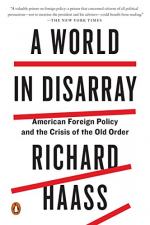|
This section contains 1,370 words (approx. 4 pages at 400 words per page) |

|
Summary
Chapter 6 begins by stating that regional conditions also play a major role in world order. Even small countries, Haass notes, can have a significant impact on their neighbors. Immediately following the Cold War, the Middle East was generally stable. Though most governments were autocratic, they respected accepted borders and acknowledged Israel as the region’s dominant power. There was also significant international support for military intervention following Iraq’s invasion of Kuwait in 1990. The ill-advised U.S. invasion of Iraq in 2003 changed this, plunging the country into civil war, souring opinions of democracy in the region and empowering Iran. Haass argues that President Obama made a series of mistakes that further destabilized the region and hurt U.S interests there. Following the Arab Spring, he alienated allies by turning against Egypt’s embattled President Mubarak, failed to properly support Libya’s democratization, and...
(read more from the Chapters 6 - 7 Summary)
|
This section contains 1,370 words (approx. 4 pages at 400 words per page) |

|




